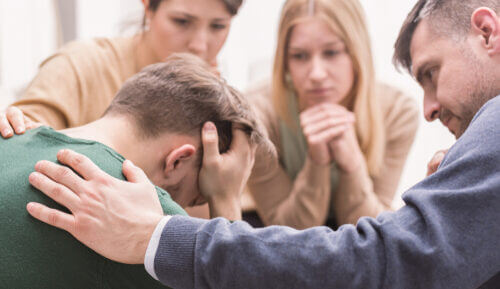
Page contents
Across the world, it’s estimated that between 1-2 per cent of people are living with bipolar disorder. In the UK, this equates to over 1 million people and bipolar is one of the most common long term conditions.
Despite the large number of people living with bipolar disorder, it takes an average of nine years to be diagnosed with the condition, meaning that many people face years without the support and treatment they need. This, alongside social stigma relating to mental health conditions, often results in people with the condition facing unnecessary and avoidable challenges.
In this article, we’ll look at what bipolar disorder is, the different symptoms and what treatments are available.
What is bipolar disorder?
Bipolar disorder is a serious mental health condition, also referred to as a brain condition, that significantly alters a person’s mood.
Previously known as manic depression, bipolar disorder, by its names sake, can be defined as two (bi) contrasting (polar) emotional states. This means that a person with bipolar disorder will typically experience extremely high moods as well as severe bouts of depression.
There are a few different types of bipolar disorder determined by the symptoms a person experiences.
These categories include:
- Bipolar 1
- Bipolar 2
- Rapid cycling bipolar
- Cyclothymia / cyclothymic disorder
- Unspecified bipolar
It’s important to note that there is still a lot of research to be done around bipolar disorder. This means that medical professionals occasionally have different opinions on diagnosis and some of the categories listed above are not always officially classed as a type of bipolar.
Symptoms of bipolar disorder
As with the majority of mental health conditions, the symptoms of bipolar disorder can differ from person to person, but there are some commonalities in the way the condition tends to manifest.
The typical symptoms of bipolar disorder are mood episodes.
These can be categorised into the following states:
Depression
During a depressive episode, you will typically feel extremely low. You may also feel fatigued and lethargic, like you don’t want to do anything; even talking to your family or friends can feel like too much.
Many people diagnosed with bipolar disorder will be diagnosed with depression first. Arguably, this is because the ‘low’ periods experienced are more debilitating than the highs, and something they are more likely to seek help for. However, this isn’t to say that manic episodes are any less impactful.
Common side effects of depression include:
- Feeling tearful
- Not being able to concentrate
- No longer enjoying things you normally like
- Feeling worthless and like there is no hope
- Not eating enough or eating too much
- Misusing alcohol or drugs
During a depressive episode, you might feel like you want to harm yourself or even end your life.
If you are feeling suicidal, there is lots of help and support available:
- Call 999
- Visit A&E
- Book an emergency appointment through your GP
- Speak to your local NHS urgent mental health helpline (available in England)
Remember that if you feel unable to keep yourself safe, it is a medical emergency. You won’t ever be wasting anybody’s time and there are people there to help you to feel better.
Mind offers a comprehensive guide to the different help you can get in a crisis. You can find this on their website here.
Mania
On the other end of the bipolar disorder spectrum are manic episodes. When experiencing mania, you will feel extremely happy, often to the point where your excitement is almost uncontrollable.
Common side effects of mania include:
- Being easily distracted and unable to concentrate on one thing
- Feeling extremely confident
- Sleeping less, or feeling as though you need less sleep
- Talking a lot and feeling like you can’t get your words out quick enough
- Taking more risks or acting recklessly
- Spending more money than you usually would
- Misusing drugs or alcohol
A person can also experience symptoms of psychosis as part of their bipolar disorder, this could involve hallucinations or delusions and is more likely to occur during a manic episode. Although rare, it is a frightening symptom to experience and may require hospitalisation in extreme cases.
Mixed state
Also referred to as a mixed episode, this is when a person experiences high and low episodes simultaneously.
Mixed episodes can be confusing and distressing to experience. As the emotional states are conflicting, it makes it really difficult for you to pinpoint how you are feeling and express this to others.
Again, if you ever feel like you aren’t able to keep yourself safe, please reach out for help.
What causes bipolar disorder?
Although there is no one set cause for bipolar disorder, there are a number of factors that have been linked with the condition.
These include:
- A chemical imbalance in the brain – like many other mental health conditions, research suggests that the symptoms of bipolar disorder are caused by a differing level of the chemicals in our brains, with the different emotional states being triggered when these chemicals are too low or too high.
- Genetics – whilst there isn’t a specific gene thought to cause bipolar disorder, people whose family members have the condition are more likely to develop it themselves.
- Triggers – the symptoms of bipolar disorder may be brought on when a person goes through an extremely stressful situation, such as losing a loved one or being in an abusive relationship.
As we have already mentioned, there is still significant research to be done around bipolar disorder, including how it is caused. The above are examples of potential causes, but will likely not cover every instance of the condition.
Treatments for bipolar disorder
The correct treatment should make it possible for you to live a good quality of life, without the symptoms of bipolar disorder having a detrimental impact on your wellbeing.
In most situations, a combination of treatments will be recommended to help with your different symptoms. This could mean that there will be an element of ‘trial and error’ in your treatment to begin with, whilst you and the healthcare professionals working with you find out exactly what helps to minimise and manage your symptoms.
The NHS highlights medical treatments for bipolar including:
- Mood stabilisers to help prevent depressive and manic episodes.
- Medications to treat the symptoms of depression and mania.
And lifestyle treatments including:
- Learning more about your individual triggers and the signs of an episode.
- Adopting positive lifestyle changes such as regular exercise, eating a balanced diet and trying to establish a good sleep pattern.
You might also be recommended psychological treatment to help with your symptoms. This could include different types of therapy where you are able to talk through how you are feeling and receive support from a specialist.
It’s possible that not all of the above treatments will work for you and it’s important that you, alongside your doctor and other healthcare professionals, recognise that treatment is completely individual and should respond to your specific experience of bipolar disorder.
If you ever feel like you’re not getting the support you need, don’t be afraid to reach out for a second opinion.
World Bipolar Day
World Bipolar Day (WBD) falls on March 30 each year. The date was chosen to correspond with the birthday of Vincent van Gogh, who was diagnosed with bipolar after his death.
The day is an opportunity to share information about bipolar disorder, helping to raise awareness of the condition and reduce the stigma surrounding it.
To find out more about World Bipolar Day and how you can get involved, you can visit the website here.
Help and support
Receiving a diagnosis for bipolar disorder
Information about bipolar disorder in pregnancy
Helplines and support for your mental health:
Samaritans – 116 123
Rethink Mental Illness
Sane


